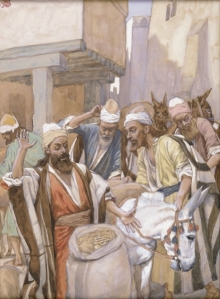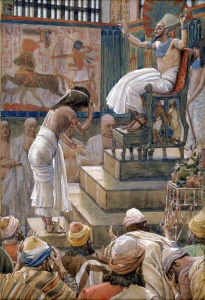Jacob (now called Israel) and his family end up eating all of the corn that they got in Egypt, so Jacob tells the boys that it’s time to go get more. Judah brings up the detail about having to take Benjamin with them (they seem to have forgotten about Simeon rotting away in an Egyptian jail) and says that they will starve if they don’t do things “the man’s” way. So Israel/Jacob tells them to gather up some balm, honey, spices, myrrh, nuts and almonds as gifts for “the man.” He then tells them to take twice the money they need for the food and to take Benjamin along. At this point he remembers poor forgotten Simeon, and mentions trying to get him back as well. The boys do as their told and head out to get some food. (43:1-15) Why they didn’t eat the nuts and honey, or how they grew them when they couldn’t grow other food is never explained. There is also never an explanation as to why God isn’t just helping them instead of forcing them to go to Egyptians for help.
When Joseph spots the brothers and has his butler bring them to his house for lunch. This scares the boys because they think that Joseph thinks they had stolen money the first time they were there and is going to make them slaves. (43:16-18)
When they get to Joseph’s house they explain to the steward about the money and he tells them not to worry and explains that he had put their money back. He then brings out Simeon, feeds their donkeys, and lets them clean up for lunch. (43:19-24)
When Joseph arrives, the brothers give him their gifts. Joseph chit chats with them about their family and they have lunch. (43:25-34)
 The next morning Joseph has his steward fill up the brothers’ sacks with food, put their money back into the sacks, and put a silver cup in Benjamin’s. Then when the brothers leave the city he has the steward chase them down, accuse them of stealing the cup, and bring them back to him. (44:1-14)
The next morning Joseph has his steward fill up the brothers’ sacks with food, put their money back into the sacks, and put a silver cup in Benjamin’s. Then when the brothers leave the city he has the steward chase them down, accuse them of stealing the cup, and bring them back to him. (44:1-14)
Joseph accuses them of theft, and tells them that Benjamin will be his slave since he was the one who actually “stole” the cup, and that the rest of them are free to leave. Judah, begs Joseph to take him instead and let Benjamin go, because of what the loss of Benjamin would do to his father. (44:15-34)
Joseph can’t hide his identity anymore and tells them who he is, and that they shouldn’t worry about what they had done to him, because it was obviously God’s plan. (45:1-7)
Joseph tells his brothers to go get their father and their families and bring them to Egypt so he can take care of them for the next five years. Then the pharaoh tells Joseph to do what he had already done and gives him wagons and supplies for his brothers. Joseph also gives his brothers some new clothes and gives Benjamin a bunch of money. (45:8-24)
The brothers go home and tell Israel (who is now called Jacob again), about Joseph and his offer. Jacob, (who is now called Israel again), agrees to go so that he can see Joseph. (45:25-28)
Israel gets ready for his trip to Egypt, but stops at Beersheba for the night. God comes to Israel in his dreams and calls him Jacob, even though he’s the one who changed his name to Israel. God tells Israel/Jacob not to be afraid to go to Egypt because he will go with him and make him a great man there. (46:1-4)
The next morning Israel (who is once again called Jacob) gathers up all 67 members of his family, and all of their livestock and other possessions and they all head for Egypt. He sends Judah ahead to tell Joseph they will meet him in Goshen. (46:5-28)
Joseph meets his family in Goshen, and he and his father have a teary reunion. (46:29-32)
Joseph tells his family to tell the Pharaoh that they are shepherds so that the Pharaoh will settle them in Goshen because all shepherds are “an abomination unto the Egyptians.” (46:33-34) Why a man in his position wouldn’t know that Egyptians themselves were often shepherds who did not consider themselves abominations is not explained.
 After getting their story straight, Joseph introduces his family to the pharaoh, and gets permission for them to settle in Goshen, “in the land of Rameses” where he makes sure they have plenty to eat. (47:1-12) No explanation is given for the pharaoh calling the area “the land of Rameses”, when Ramses I wouldn’t even be alive for another 500 years.
After getting their story straight, Joseph introduces his family to the pharaoh, and gets permission for them to settle in Goshen, “in the land of Rameses” where he makes sure they have plenty to eat. (47:1-12) No explanation is given for the pharaoh calling the area “the land of Rameses”, when Ramses I wouldn’t even be alive for another 500 years.
After getting his family settled, Joseph gets back to his job of making sure that there is plenty of food for people throughout Egypt. (47:13-26)
During his 17 years in Egypt, Jacob (now called Jacob or Israel randomly) does well and his family grows, but as he nears death he makes Joseph promise to bury him back home and not in Egypt. (47:27-31)
Since his father is sick, Joseph introduces him to his sons. Jacob blesses the boys and says that the younger one will be more successful than the older, seemingly trying to pass on the problems he had with his own brother. (48:1-20)
Jacob then tells Joseph that one day God will make sure he returns to his native land which Jacob has made more his land than his brothers’, once again trying to sow discord amongst brothers. (48:21-22)
Jacob then gathers all of his sons together and tells them their futures. Most aren’t so good, but he says Judah (the brother-seller) will do the best, he heaps a good bit of praise on Joseph then makes them promise to bury him with Abraham and crew (again) then he dies. (49:1-33) The year is 1731 BC.
After Jacob dies, Joseph gets permission to take him home for burial, and he and his brothers bury Jacob the maid-breeder in the same place as his incestuous ancestors. (50:1-13)
The boys then return to Egypt where Joseph formally forgives his brothers, again, for what they had done to him and eventually dies at the age of 110. He is mummified and buried in Egypt. (50:14-26)
And so ends the book of Genesis.
Next time we will start on the book of Exodus, which doesn’t contain near as much incest, but does contain a lot more murder, genocide, and other godly death and suffering.